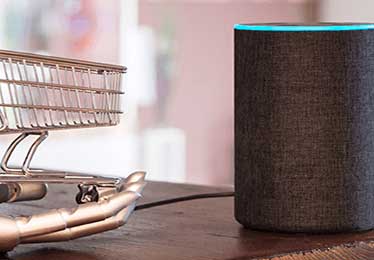Andrew Zola


Voice commerce has arrived. Today, retailers can sell products by designing experiences that leverage speech recognition technology and its capabilities.
According to Meticulous Research, wthe speech recognition market is forecasted to be worth approximately $26.79 billion by 2025 (growing at a CAGR of 17.2%). The number of voice assistants used around the world is also expected to reach a whopping 8.4 billion by 2024.
As such, speech recognition technology, like the dotcom boom, is well-placed to create a new avenue for sales teams around the planet. But before we get ahead of ourselves, let’s first define it.
The ability of machines or software to identify spoken words is known as speech recognition technology. Rudimentary speech recognition software can convert speech to text, but it can only identify words when spoken clearly.
More advanced technologies powered by artificial intelligence (AI) understand different tonalities, accents, dialects and languages, they can communicate with humans in a natural way.
Tip:
The ability of machines or software to identify spoken words is known as speech recognition technology. Rudimentary speech recognition software can convert speech to text, but it can only identify words when spoken clearly.More advanced technologies powered by artificial intelligence (AI) understand different tonalities, accents, dialects and languages, they can communicate with humans in a natural way.Tip:Speech recognition technologies can be trained to perfection with crowd-sourced voice recording via clickworker. To understand the mechanics behind these advanced technologies, you can read more about how speech recognition systems work.
As a result, most of us now have some experience with voice assistants like Alexa and Siri. While we may have used it to check on the weather or get directions while driving, what about purchasing goods and services?
While it’s not the leading use case for speech recognition systems, it’s growing exponentially. This means that businesses should take steps to accommodate voice-based searches, shopping, and payments.
Brands that leverage voice-activated technologies are well-placed to deliver highly personalized, engaging, intuitive, and immersive experiences. Furthermore, customers that use voice apps and devices are more inclined to look at products suggested by voice-activated shopping assistants.This approach helps businesses connect with consumers at different touchpoints during the customer’s journey. However, people still need to see a product before they buy it. For a deeper understanding of how speech recognition systems are developed and enhanced, consider reading about the development of speech recognition systems.
This approach helps businesses connect with consumers at different touchpoints during the customer’s journey. However, people still need to see a product before they buy it.
Speech recognition platforms work together with e-commerce solutions to close the deal. To get there, enterprises must adapt their sales and marketing strategies to accommodate voice assistants and online shopping to the maximum effect.
You’ve probably heard of Search Engine Optimization (SEO), but the future is voice SEO. In this scenario, make sure that your website or e-commerce platform ranks first in a voice search. Unlike search results on a computer or mobile device, voice assistants will vocalize top results.
Like businesses had to adapt to the rise of Google’s mobile-first index, which ranks the mobile version, companies now must accommodate voice assistants like Alexa. In this scenario, black hat SEO tactics won’t work. But as voice search enhances user experiences with search engines, you must optimize your website for voice and mobile.
With a bit of effort, your brand could be the first a voice assistant suggests, triggering the customer’s journey. However, this space is highly competitive, so the earlier you get in, the better are your chances.
The primary difference between voice and text searches is the level of conversational language used. For example, while you might type “best coffeeshop NYC” in a Google search console, you’re more likely to say, “Hey, Alexa, what are the best restaurants in New York City?”
As conversations are the basis for voice search, your content must sound as natural as possible. If it doesn’t sound the way people speak to each other, you probably won’t be found. It’ll also help to have simple answers to specific questions to take advantage of Google’s featured snippets.
In this scenario, it’s important to create content that Google perceives as authoritative and informative. If you manage to get this coveted spot, you’ll be able to answer questions voice searchers are asking and then guide them through your online store. But this is, of course, easier said than done.
You can’t achieve this by repeating a keyword several times. Instead, craft your featured snippet content well and transform it into a promotional opportunity for your brand. If you’re concentrating on the local market, your relevant, concise content must also focus on a local audience.
Voice assistants look for content that best suits the user’s intent. This means that ranking high on a localized voice search depends on the following:
In-skill purchases are relevant to brands who have built their own Alexa skill. This approach helps them sell content or services within the skill itself. It’s like the speech recognition version of in-app purchases.
As such, in-skill purchases are all about selling products and services leveraging a customized interaction model. The idea here is to make buying products a seamless experience. This means that consumers should also be able to pay for products using their voice alone.
According to Amazon, there are three types of in-skill products that you can offer in your skill:
British online grocery store Ocado is a fantastic example of leveraging an Alexa skill to their advantage. Over three years ago, they launched an Alexa skill that helped customers add groceries to their shopping list (and have never looked back).
As you can see, speech recognition technology and its applications in sales are still in their infancy. However, in the near future it will be an opportunity that all marketers focus on. As a result, businesses must take steps to accommodate voice search, purchases, payments, and more today.
Andrew Zola